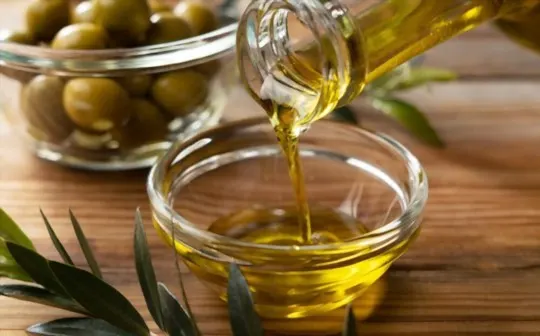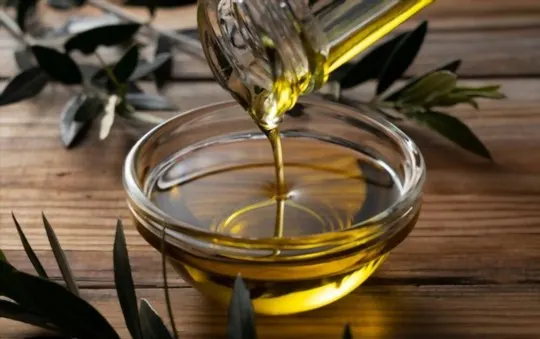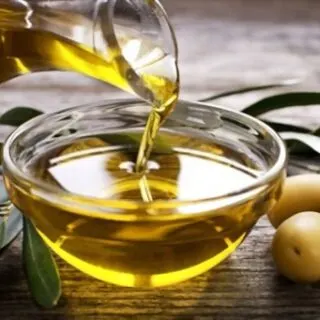Most of us are familiar with olive oil as a staple item in our kitchen pantries, but have you ever stopped to think about how long it lasts?
It’s a surprisingly common question among home cooks, and one that raises a lot of confusing answers.
Technically speaking, some types of olive oil will last practically forever at room temperature; however, others may go bad sooner than expected due to oxidation or impurities.
In this blog post, we’ll explore the shelf life (or expiration date) for different kinds of olives oils and answer the big question: Does olive oil go bad?
What’s Olive Oil?

Olive oil is a type of vegetable oil that’s extracted from olives, the fruit of the olive tree.
It’s widely used in cooking and cosmetics and has a number of health benefits.
Olive oil is composed of mostly monounsaturated fats, which are considered to be healthy.
It also contains small amounts of saturated fat and polyunsaturated fat.
The different types of olive oil have different proportions of these fats.
Extra virgin olive oil is the highest quality and has the most antioxidants, which are compounds that protect your cells from damage.
Virgin olive oil is also high quality but has slightly less antioxidants than extra virgin olive oil.
Refined olive oils are lower quality because they’ve been processed to remove impurities.
They also have fewer antioxidants than virgin or extra virgin olive oils.
How Long Does Olive Oil Last?

When it comes to olive oil, the most important thing to know is that it doesn’t last forever.
Just like any other oil, it will eventually go bad.
But if you store it properly, you can greatly extend its shelf life.
Olive oil should be stored in a cool, dark place.
The ideal temperature is between 50 and 59 degrees Fahrenheit.
If your kitchen is too warm or too cold, find a spot in your pantry or cupboard that’s a little more stable.
And make sure the bottle is sealed tightly when you’re not using it – oxygen is one of the main things that causes olive oil to go bad.
You’ll also want to use olive oil within a few months of opening it.
Once opened, the clock starts ticking and it will slowly degrade over time.
So if you have a half-full bottle that you’re not using very quickly, consider transferring it to a smaller container so you can finish it before it goes bad.
With proper storage, olive oil can last for several months – but it’s always best to err on the side of caution and use it up sooner rather than later.
How Should You Store Olive Oil?

When it comes to olive oil, proper storage is key to maintaining its freshness and flavor.
Here are a few tips on how to store olive oil:
- First, always check the expiration date before purchasing or using olive oil. Once opened, olive oil should be used within two months.
- Store olive oil in a cool, dark place. Avoid storing it near the stove or in direct sunlight, as this can cause the oil to degrade more quickly.
- Olive oil should be stored in a dark glass bottle or container. If stored in a clear container, the light can cause the oil to turn rancid more quickly.
- Make sure the lid on your olive oil container is tight fitting and sealed properly. This will help keep oxygen out and prevent the oil from going bad.
Can You Use Expired Olive Oil?

It’s a common question with a not so common answer.
The truth is, it depends on the olive oil.
If it’s a lower quality olive oil, then it’s probably not going to be safe to use after its expiration date.
However, if it’s a higher quality olive oil, then it might still be okay to use.
The best way to tell is by doing a smell test.
If the olive oil smells rancid or off, then it’s probably not safe to use.
But if it still smells fresh, then it should be fine to use.
Another thing to keep in mind is that even if an olive oil is still good to use after its expiration date, its flavor might have changed.
So if you’re using it for cooking, you might want to taste it before using it to make sure that the flavor is still what you’re expecting.
Generally speaking, higher quality olive oils will last longer than lower quality ones.
So if you’re not sure whether or not your olive oil is still good to use, err on the side of caution and throw it out.
It’s better to be safe than sorry.
What are the Signs That Olive Oil Has Gone Bad?
If olive oil has gone bad, it will have a rancid or off odor.
Good olive oil should have a fresh, fruity smell.
You may also notice that the color of the oil has changed.
Rancid olive oil will be a yellowish-brown, while good olive oil will be a greenish-gold.
The flavor of rancid olive oil will be harsh and unpleasant.
Good olive oil will have a mild, fruity flavor.
If you’re not sure whether your olive oil has gone bad, taste it.
If it tastes bitter or sour, throw it out. Once olive oil goes bad, there’s no salvaging it.
It’s best to err on the side of caution and throw it out if you’re not sure.
Olive oil doesn’t last forever, but it does have a fairly long shelf life.
With proper storage, olive oil can last for up to two years.
After that, it will start to go bad. Be sure to store your olive oil in a cool, dark place to prolong its shelf life.
Conclusion
Olive oil is a healthy, versatile kitchen staple with a long shelf life.
When stored properly, olive oil can last for up to two years.
However, olive oil does go bad eventually, and it’s important to be able to identify the signs that it has gone bad.
If you’re not sure how long your olive oil has been sitting in the pantry, give it a sniff test – if it smells rancid, it’s time to toss it.
Thanks for reading and be sure to check out our other blog posts for more tips on kitchen staples.

How Long Does Olive Oil Last? Does It Go Bad?
Ingredients
- Olive oil
- Air-tight containers or Ziplock bags
- Labels and markers
Instructions
- Store your product in an labelled container in a cool, dark place like the pantry or fridge.
- If your food is frozen, allow it to thaw in the fridge before cooking.
- Make sure to look for signs that your food has gone bad before eating it.

Carrie is a food writer and editor with more than 15 years of experience. She has worked for some of the biggest names in the food industry, including Bon Appétit, Food & Wine, and Martha Stewart Living.
As the Editor in Chief of IntroChicago.com, Carrie oversees all of the content on the site. She also manages the team of contributing writers and editors, who help to create delicious recipes, helpful tips, and informative articles that you’ll find on the site.
A native of the Chicago area, Carrie is passionate about all things food. She loves trying new restaurants and experimenting with new recipes in her kitchen. She’s also a graduate of the Culinary Institute of America, so she knows a thing or two about food!
